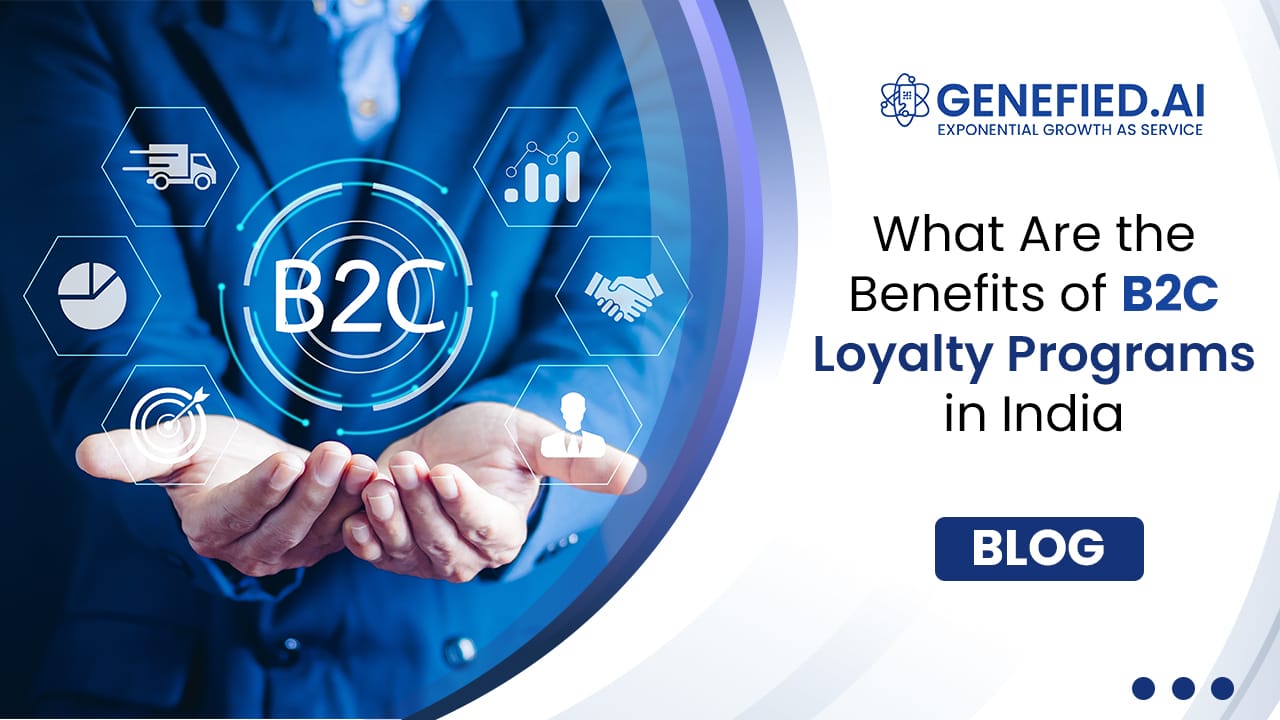Genefied helps Enterprise Brands capture 1st party data to further get insights, retarget and build lookalike audiences.

With the current highly competitive business era, Indian companies are always looking for new paths to retain and attract customers. Among the most efficient strategies that are being embraced by businesses is the use of B2C Loyalty Programs.
The programs are intended to compensate customers for their loyalty and make them repeat purchases. But why are loyalty programs so important, especially in the Indian market? Let’s explore the many benefits of B2C loyalty programs in India and understand how they can boost your business growth.
Before we dive into the advantages, let's understand what precisely a B2C loyalty program is. B2C is short for Business-to-Consumer, i.e., companies selling products or services directly to individual consumers.
A B2C loyalty program is a promotional tactic that recognizes customers for frequent purchases of products or services. These rewards may be in the form of points, rebates, special deals, presents, or entry into exclusive events.
The Indian market is expanding quickly, with millions of customers being exposed to greater variety than ever. Due to the emergence of e-commerce, mobile internet, and digital payments, Indian consumers are now better-informed and more demanding.
With such a competitive market, good products are not the only requirement. Companies must establish long-term relationships with the customers, and here comes the role of B2C loyalty programs.
1. Boosts Customer Retention
The most daunting task for any company is to get customers to return. It can be as expensive as five times the cost of getting a new one. With a reward program, customers are made to feel valued and rewarded for staying with the company. It causes them to be less inclined to change to competitors. In India, where brand loyalty is not yet mature in most industries, reward programs enable companies to tie down customers for longer.
2. Drive Sales and Revenue
Loyal customers also purchase more. When customers earn points or receive special offers through a loyalty program, they are encouraged to purchase more in order to maximize rewards. This automatically translates into higher sales volume and revenue. For Indian businesses, particularly retail, hospitality, and e-commerce, this is a surefire method to increase profits without incurring additional expenses for advertising.
3. Creates Stronger Customer Relationships
Loyalty programs establish a personal connection between the brand and the individual. With personalized rewards and communications according to customer interests, companies can establish trust and emotional attachment. In India, where personal relationships are appreciated, it enables organizations to go deeper with their customers and enhance brand image.
4. Encourages Word-of-Mouth Marketing
Word-of-mouth is one of the greatest assets of Indian marketers. Satisfied customers that are rewarded and appreciated will promote the brand to their network of friends and relatives. This is fostered by a well-crafted loyalty program that makes customers feel unique. This kind of word-of-mouth advertisement attracts new customers at no additional marketing expense.
5. Gives Valuable Customer Insights
A B2C loyalty program gathers information about customer behavior, their likes and dislikes, and their purchasing habits. This information is a goldmine for companies as it provides insight into their customers. Indian companies can utilize this knowledge to customize products, develop specific marketing campaigns, and enhance customer support. This data-driven strategy is the key to growth in today's competitive marketplace.
6. Provides Competitive Advantage
In retail, FMCG, and e-commerce segments, numerous brands sell similar products. Rewards programs provide a distinctive competitive edge to a company by providing customers with value in addition to the product. Customers will be more likely to select brands that pay them back for their loyalty. This competitive edge is important in India's highly competitive markets, as it enables companies to differentiate themselves.
7. Facilitates Digital and Mobile Engagement
India has witnessed explosive growth in digital payments and smartphone usage. Contemporary B2C loyalty programs leverage mobile apps, digital wallets, and QR codes to interact with customers. The ease of this convenience wins over younger, more tech- savvy Indian customers who like to shop and collect rewards online. Businesses can become more relevant and enhance customer experience by incorporating loyalty programs with digital channels.
8. Facilitates Cross-Selling and Upselling
Loyalty programs enable companies to suggest similar products or services to a customer based on purchasing history. For instance, a consumer purchasing groceries frequently can be offered discounts on home-related products. This cross-selling and upselling enhance average order value and build a strong relationship with the customer.
9. Decreases Marketing Expenses
As repeat purchase from loyal customers is common, companies can cut down costs on costly customer acquisition campaigns. Instead of investing massive money on advertisements to lure new customers, companies can invest in retaining existing customers by implementing loyalty rewards, which is cost-saving and effective.
Retail Industry
Retail outlets utilize loyalty programs to award points for each purchase, which can later be redeemed by customers. Indian retailers such as Big Bazaar and Reliance Retail have loyalty programs that encourage customers to return frequently.
E-commerce
Online giants Amazon and Flipkart have loyalty schemes such as Amazon Prime and Flipkart Plus providing perks such as accelerated delivery, exclusive offers, and reward points. They achieve a massive loyal customer base and frequent purchase behavior.
Hospitality
Indian hotels and restaurants award loyalty points to promote repeat business. For instance, Taj Hotels operates a loyalty club "Taj InnerCircle" which awards points that can be redeemed for accommodation and dining experiences.
FMCG (Fast Moving Consumer Goods)
Several FMCG companies operate loyalty schemes through product packaging codes submitted by customers online to earn rewards. This enables them to connect with consumers and foster brand loyalty.
While loyalty programs have numerous advantages, Indian businesses also have some challenges:
Customer Awareness: Customers still do not fully comprehend how loyalty programs work or benefit them.
Program Complexity: If the program is too complex, customers will not participate as much.
Technology Access: In rural India, digital loyalty programs might be restricted.
Cost Management: Businesses need to find a balance between providing enticing rewards and keeping costs low.
In spite of such challenges, a well-designed loyalty program can beat obstacles and generate high returns.
Q1: How can an Indian small business initiate a B2C loyalty program with limited funds?
Answer: Small businesses can start with uncomplicated loyalty programs such as punch cards, discount coupons, or simple points systems. They do not require costly software to start; even manual recording may suffice. Prioritize good communication and providing genuine value to customers. As the firm grows, they can use digital means.
Q2: What kind of rewards are Indian customers most likely to accept in a loyalty program?
Answer: Indian customers value rewards that are practical and meaningful. Offers of discounts on best-selling items, cashback promotions, free trials, and priority access to events have good returns. Customized rewards based on purchase history perform better because they align with customer interests.
Q3: Do B2C loyalty programs enable companies to survive in a recession?
Answer: Yes. Loyalty programs retain current customers, which is less expensive than acquiring new ones. In economic downturns, loyal customers keep purchasing from familiar brands. Further, programs giving small rewards induce repeat purchases, enabling companies to have constant cash flow.
Q4: How do digital payments affect B2C loyalty programs in India?
Answer: Mobile payments have simplified integrating loyalty programs with mobile applications and e-wallets. Customers can earn and redeem points in real time during transactions, thus creating a seamless process. This ease improves the level of participation and engagement in the program.
Q5: How do companies gauge the success of their B2C loyalty programs?
Answer: Companies monitor customer retention ratio, repeat purchase frequency, average ticket size, and program enrollment rates. Feedback and redemption rates also help. Data analysis assists in optimizing the program to offer maximum benefits.
Q6: Do loyalty programs work better in urban or rural India?
Answer: Loyalty programs generally work better in urban locations owing to increased digital penetration and awareness. Nonetheless, companies can create tailor-made programs for rural customers through SMS, voice calls, or paper cards to target more people.
Q7: What are the common mistakes that companies should not make while operating loyalty programs?
Answer: Common errors are making the program overly complicated, providing irrelevant incentives, bad communication, and not paying attention to customer data security. Consistency and transparency are the most important considerations when establishing trust and success.
Simply put, a B2C loyalty program is a strong business tool in India for winning, retaining, and expanding customer base. With increasing competition and consumer shift, loyalty programs assist firms in establishing strong relationships, boosting sales, and achieving a competitive advantage. Whether you own a small store or a big e-commerce website, a well-planned loyalty program can fetch long-term rewards and business prosperity.


Copyright 2025 Genefied Brand Protection Solutions Pvt. Ltd. All Right Reserved